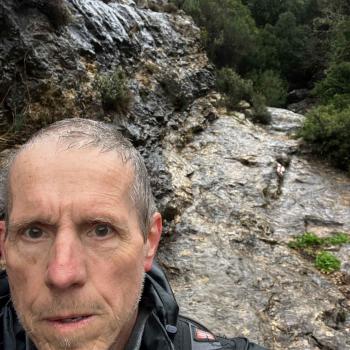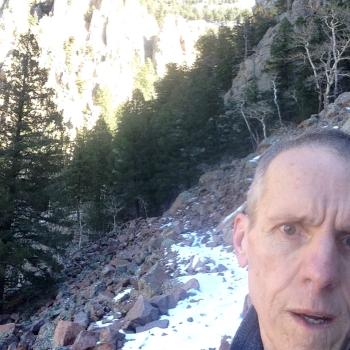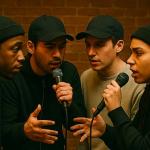 So there we were, on a warm, autumn evening just before the sun set – my five year old self with my three year old brother, my baby sister and my parents – approaching the main road after about a mile of walking on a dirt road. This was not the plan when we set out on our Sunday drive. We were supposed to be seeing an old historic site on dad’s map, but a missing bridge where the map said there would be a bridge led to getting the car stuck in the stream and the only thing to do was to walk back to the main road. “And now,” as Paul Harvey so often said, “The Rest of the Story.”
So there we were, on a warm, autumn evening just before the sun set – my five year old self with my three year old brother, my baby sister and my parents – approaching the main road after about a mile of walking on a dirt road. This was not the plan when we set out on our Sunday drive. We were supposed to be seeing an old historic site on dad’s map, but a missing bridge where the map said there would be a bridge led to getting the car stuck in the stream and the only thing to do was to walk back to the main road. “And now,” as Paul Harvey so often said, “The Rest of the Story.”
First rule of pilgrim life: life is what happens when we are making other plans. John Lennon said that, right? Nope. It turns out this phrase has a history far older than Lennon. He did say it, or something very like it, in a song called Beautiful Boy, but before he did Allen Saunders, Proverbs, Publius Syrus and Thomas a Kempis uttered the same idea. My favorite is attributed to Jewish folklore: “Man plans, God laughs.”
You might say this blog is a meta pilgrimage, to coin a phrase, because as you follow my exploits and follies, you will go down virtual as well as actual alleys. Of which that last paragraph is an example. What seemed to be a simple quotation turned out to involve a journey of its own (if you follow the hyperlink that is). Far from being a latter day Sigeric the Serious, who walked straight from Canterbury to Rome and back, my pilgrim life has often been in circles or down dead ends. And you get to go along. Some dead ends are not dead at all, but gifts, easter eggs before there were coders.
Nor are all wanderings of the body. In fact physical wanderings inevitably spawn mental wanderings, either as you go or upon remembering. But let me get back to the story.
… The sun was well above the tree line as we reached the road and spied a house not far away. It was the only house we could see and thus the one dad approached. Not only was it alone, it was well weathered, on the verge of ramshackle. Yes, I remember it that way because it was true inside as well as out.
Dad knocked and a man over sixty answered. We stood a few feet away, mom with sister in arms and the two of us little boys. The door was two or three steps higher so we must have looked rather imploring and tired, so he invited us in and I entered a world I had never seen.
Ther e was just the one room, lit by kerosene, with a cast iron stove on one end. This was 1958 by the way. A rug of some kind hung along one wall, which I would later realize was what separated the living space from the sleeping space. In a large stuffed chair sat a woman of similar age, presumably the man’s wife. Her gray hair was caught up in a bun with strands escaping from beneath a small bonnet on her head. She stood up as we entered, looking uncertain with so many strangers in the room. The man explained what was happening.
e was just the one room, lit by kerosene, with a cast iron stove on one end. This was 1958 by the way. A rug of some kind hung along one wall, which I would later realize was what separated the living space from the sleeping space. In a large stuffed chair sat a woman of similar age, presumably the man’s wife. Her gray hair was caught up in a bun with strands escaping from beneath a small bonnet on her head. She stood up as we entered, looking uncertain with so many strangers in the room. The man explained what was happening.
There was a telephone which dad used to call a gasoline station the man mentioned. I wish I could say it was one of those old candlestick phones but that would have made an impression because grandpa and grandma had one that I loved to handle when we visited.
Dad and the man left, getting into his pickup truck, leaving the five of us and the woman there. Mom looked at me and whispered, “If she offers you any food, say no unless it’s an apple.” Was that because we should not take something they obviously needed or because mom worried about the safety of anything she might cook? A time of uncomfortable conversation between the women ensued. Mom had grown up poor, but not this poor. The couple could have been part of “Li’l Abner” or “The Real McCoys.” 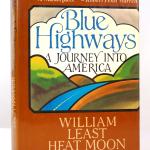
Thirty years later, reading William Least Heat Moon’s Blue Highways, I came across a moment very like that one from my boyhood. In Nameless, Tennessee Least Heat Moon is eating a piece of buttermilk pie and listening to an Edison phonograph with the morning glory speaker. “It was one of those moments that you know will stay with you to the grave: the sweet pie, the gaunt man playing the old music, the coals in the stove glowing orange, the scent of kerosene and hot bread… I thought: it is for this I have come.” Sometimes it takes a generation for a moment to come to flower.
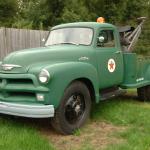 The tow truck arrived and Dad took me along in the front seat with the driver, next to the gas station attendant who wore a uniform with a cap that said “Texaco” or something like that. In minutes we were back at the car. He attached a chain and with dad at the wheel I watched as they rescued our Willys from the wet sand.
The tow truck arrived and Dad took me along in the front seat with the driver, next to the gas station attendant who wore a uniform with a cap that said “Texaco” or something like that. In minutes we were back at the car. He attached a chain and with dad at the wheel I watched as they rescued our Willys from the wet sand.
The sun had set by the time we got back to the house, where faint yellow light shone out from the windows. I did not go back in, if memory serves. Out came mom with sister in arms and brother struggling with his small legs to descend the tall steps. Dad paid the tow truck driver, shook hands with the man (probably offered some money but I do not know thar for a fact) and we headed home. Relief covered whatever anger was there….
Of the next day I remember nothing, nor most of the 3650 days that comprise a boyhood. But that day, and a few others, remain, glowing with yellow light as my own evening approaches. Who we are is where we have been.
This being Yuletide, I hope you will consider buying my book of Yuletide stories, fictional but true to life, which are available here:
https://www.amazon.com/gp/product/B0BGFJCL4Y/ref=dbs_a_def_rwt_bibl_vppi_i1




